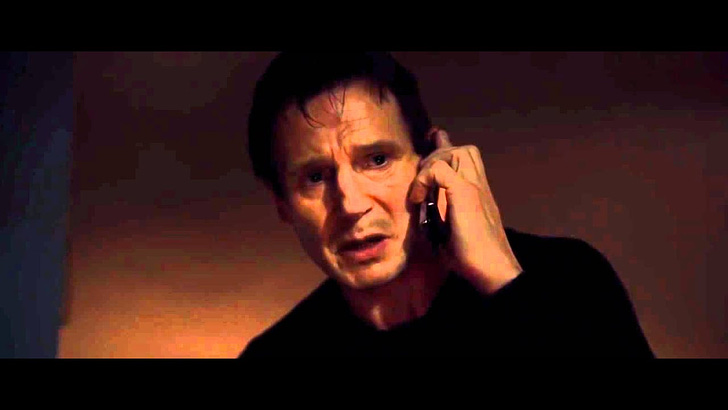Deep writing derp ahead. Prepare yourself, grasshopper.
When one is crafting a story, be it a screenplay, novel, or series, one term you may hear is the DQ, which in the writing world, does not stand for Dairy Queen or Disqualification. Usually, it’s “what is the DQ, here?”
It stands for DRAMATIC QUESTION.
This is an important structural foundation of your writing, if not THE most important plank in the world you’re building. The dramatic question is the reason you’re watching, you’re reading or you’re listening to the story being told. It’s the engine of the machine, in my opinion.
(BTW, if you haven’t subscribed, can you take a sec and do so? Thank you!)
The Dramatic Question.
It’s what the “meat” of the movie (I’m going to use film terms from here on) is all about. For example, TAKEN. We all know that film. A very simple story but with many complicated moving parts. So what is the Dramatic Question of the film TAKEN? Well, it’s posed in the trailer in its most famous scene, in fact.
The Dramatic Question of TAKEN is, then… will he rescue his daughter? Once that question is answered, the movie is essentially over. In fact, this is why some movies that you enjoy seem to end three or four times and by then you’re checking your phone and wondering why they don’t just get on with it. Here, Liam rescues his daughter, we see them at the airport, he gives her a present, and two minutes or so after he saved her, fade to black. It ends when the DQ is answered.
The DQ can be the central conflict (will James Bond / Jason Bourne / Ethan Hunt save the world), but that’s not all that it is.
In the film MICHAEL CLAYTON, for example, the Dramatic Question is, in a sense, WHO IS MICHAEL CLAYTON. It’s echoed throughout the story. His co-workers don’t really know what it is he does at the firm. His brother castigates him, tells him lawyers think he’s some kind of cop, cops think he’s some kind of lawyer, but nobody really knows who he is or what he does. But the big tell is when Clayton tells Arthur, who he’s trying to help, that he’s “not the enemy here.”Arthur responds thusly, “Then who are you?”When that is answered, “I am Shiva, god of death,” after he finishes Arthur’s business for him, the movie ends quickly.
He walks out, gets in a cab, and asks the driver to give him fifty dollars worth of driving anywhere, it doesn’t matter. Because for the first time in the movie, Clayton himself knows who he is. Fade to black.
(another kind reminder to subscribe here)
I can do this all day and, with action films, it’s actually usually straightforward (with some notable exceptions)… in TAKEN it’s simple. In THE GODFATHER, not as simple (hint, will Michael follow in his father’s footsteps?)
In STAR WARS, of course, the Dramatic Question isn’t, will Luke defeat Vader, or will Luke defeat the Empire, or will Luke save the Princess… although all of those things are part of the story (and part of the dramatic question) but rather… will Luke fulfill his destiny and become a Jedi?
Or if you want to narrow it down further… will Luke trust the Force?
He does, fires… boom! Saves the rebel base, sends Vader off spinning into the void, and flies back a hero… because he finally began to BELIEVE and trust the Force.
It’s the same in THE MATRIX. It doesn’t end until Neo BELIEVES he’s the One.
THE MATRIX is great for many reasons, but the marketing was brilliant. It asked a question, “What is the Matrix?” and that’s also what Neo was seeking, too.
But the film answers that question at mid-point. We find out what the Matrix is. But the quest to the Matrix led Neo to the ultimate question he must face.
Is he the One? Neo refuses this, in the beginning. It’s not him. However…
He STARTS to believe in the subway fight.
But it’s not until Trinity kisses him that he believes it.
Then, knock them out, tie up the loose ends quick, and it’s over. The DQ answered.
Now in series, you have differing DQs. You have an overriding DQ, perhaps (Agent Mulder’s quest to find his sister) with smaller ones… LOST did this (a bit, perhaps, too much) in that the big question was, “What is this island?” mixed up with smaller ones like “what’s that smoke?” “what happened to the polar bear?” and “Do we love or hate working in Hawaii?” cover individual episodes.
Marvel does this very well, there’s usually a larger concern and each film covers a smaller, more personal concern, but the great stories have a Dramatic Question, and, let’s be honest, it’s nearly always is what keeps you watching.
But many of them are hidden, especially in noir films (my favorites) and other epics (Citizen Kane is an exploration of his life, but the DQ is, what is Rosebud?).
If you’ve seen HELL OR HIGH WATER, the dramatic question is answered in the final scene. After the bank robberies, shootings and killings, we get a quiet scene that is incredibly powerful and an excellent capper on an excellent film. Youtube doesn’t allow it to be shared here, but look it up and remind yourself of what the film was actually about, in the end (and it’s echoed throughout the story).
If you HAVEN’T seen HELL OR HIGH WATER, what are you waiting for?
If you enjoyed this post, do me a favor and support my novels, which in turn supports me writing, matey. You can support it by buying my novels or, if you have them, leaving reviews.
Pick up a copy or leave a review for SOME ANIMALS here:
Karma will be kind to you if you do. Thank you!





